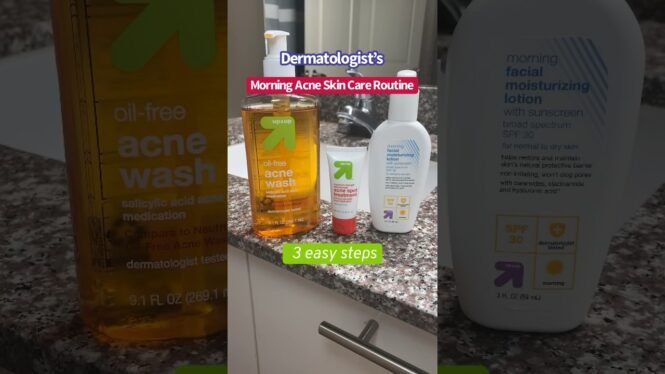Looking for an easy skin care routine to help combat acne? Look no further than Dr. Dray’s expert advice! As a dermatologist with years of experience, Dr. Dray has honed her expertise to offer you a simple yet effective approach to skin care. Say goodbye to frustrating breakouts and hello to glowing, healthy skin with her easy tips and products. Keep reading to learn more about how to achieve beautiful, acne-free skin with the help of Dr. Dray.
Introduction:
Skincare is an essential part of our daily routine, and it becomes more important when you have acne-prone skin. Acne can be a nightmare for any individual, but with the right kind of skincare routine, you can achieve clear and healthy skin. In this article, we will talk about easy skincare routine for acne-prone skin. Whether you are a beauty enthusiast or a beginner, this video will help you establish a simple and effective skincare routine for acne.
The content is a video:
The video is about skincare routine for acne-prone skin. It is available on YouTube, and you can find it using the hashtag #skincareroutine, #skincareroutines, #acneskincare, #acneskincareroutine. The video is informative and helpful for those who want to establish a skincare routine. It covers all the essential steps that you need to follow to achieve clear and healthy skin.
The importance of a regular skincare routine:
Having acne-prone skin requires a regular skincare routine. Consistency is key when it comes to taking care of your skin. A consistent skincare routine can help to prevent breakouts, reduce acne scarring, and improve the overall appearance of your skin.
Using gentle cleansers:
The first and foremost step of any skincare routine is to cleanse your skin. It is important to use a gentle cleanser that will not irritate your skin. Harsh ingredients can strip your skin of its natural oils, leading to dryness and irritation. In the video, the dermatologist recommends using a non-foaming cleanser that is gentle on the skin.
Exfoliators to remove dead skin cells:
Exfoliation is important to remove dead skin cells that can clog your pores, leading to blackheads and whiteheads. The video suggests using a gentle exfoliator that contains salicylic acid, which is effective in treating acne. However, it is important not to over-exfoliate as it can cause irritation and dryness.
Importance of toners to balance the skin’s pH levels:
Toners are often overlooked in skincare routines, but they are an essential step in maintaining healthy skin. Toners help to balance the skin’s pH levels, which can be disrupted by cleansers and exfoliators. The video recommends using a toner that is alcohol-free and contains ingredients like witch hazel, rose water, or aloe vera, which are soothing for the skin.
Spot treatments for acne:
Spot treatments are a targeted treatment for acne that can help to reduce inflammation and redness. The video suggests using spot treatments that contain benzoyl peroxide or salicylic acid, which are effective in treating acne. However, it is important not to use too much of these products, as they can cause dryness and irritation.
Hydrating moisturizers:
Moisturizers are essential to hydrate and nourish the skin. The video recommends using a moisturizer that is oil-free and lightweight, which is suitable for acne-prone skin. Moisturizers can help to prevent dryness and irritation, which can be common side effects of acne treatments.
Importance of sunscreen in a skincare routine:
Sunscreen is a crucial step in any skincare routine. UV rays can damage the skin, leading to premature aging and skin cancer. The video emphasizes the importance of using a sunscreen with at least SPF 30, which is effective in protecting the skin from UV rays.
Avoiding harsh ingredients:
Lastly, it is important to avoid harsh ingredients that can irritate the skin. The video suggests avoiding ingredients like alcohol, fragrances, and sulfates, which can be harsh on the skin. It is also important to avoid over-washing and over-exfoliating as it can cause dryness and irritation.
Conclusion:
In conclusion, establishing a skincare routine for acne-prone skin requires consistency, patience, and the right kind of products. The video covers all the essential steps that you need to follow to achieve clear and healthy skin. By following these steps, you can prevent breakouts, reduce acne scarring, and improve the overall appearance of your skin.
FAQs:
-
How often should I exfoliate my acne-prone skin?
Ans. It is recommended to exfoliate your skin once or twice a week, depending on your skin type. -
Can I use a foaming cleanser if I have acne-prone skin?
Ans. Foaming cleansers can be harsh on the skin and strip away the natural oils, leading to dryness and irritation. It is recommended to use a non-foaming cleanser that is gentle on the skin. -
What is the best sunscreen for acne-prone skin?
Ans. The best sunscreen for acne-prone skin is a non-comedogenic and oil-free formula with at least SPF 30. -
Should I use a toner if I have acne-prone skin?
Ans. Toners help to balance the skin’s pH levels, which can be disrupted by cleansers and exfoliators. It is recommended to use a toner that is alcohol-free and contains soothing ingredients like witch hazel, rose water, or aloe vera. -
Is it important to be consistent with a skincare routine for acne-prone skin?
Ans. Consistency is key when it comes to taking care of your skin, especially when you have acne-prone skin. A regular skincare routine can help to prevent breakouts, reduce acne scarring, and improve the overall appearance of your skin.

